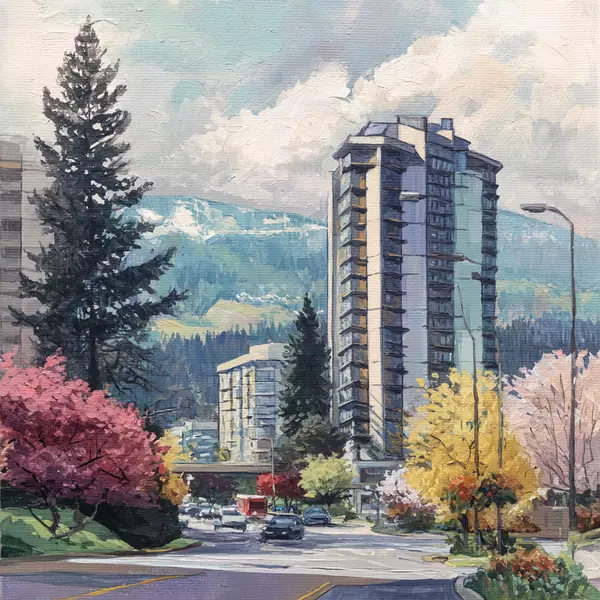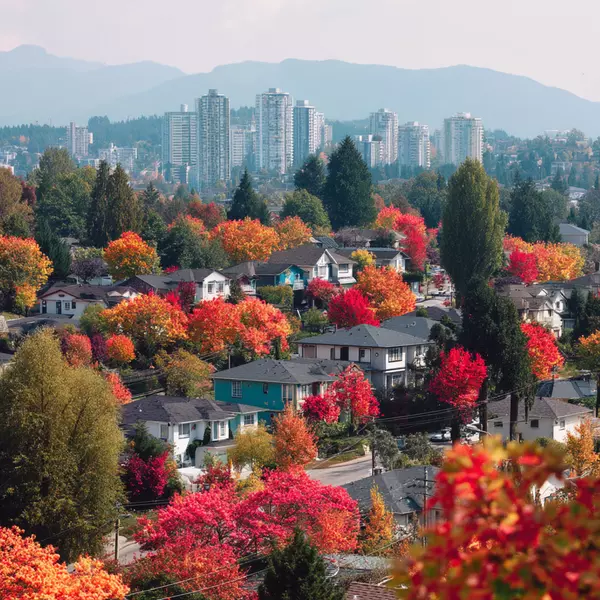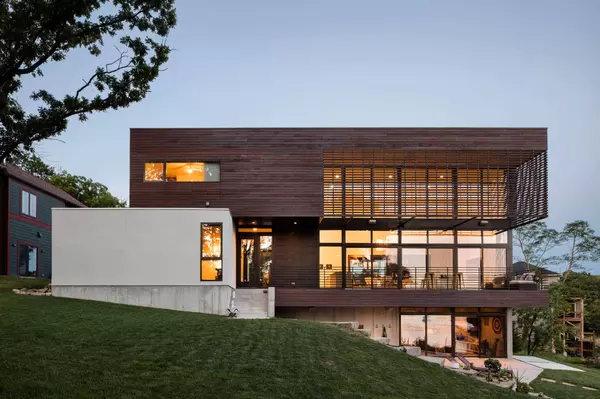Beginner’s Guide to Burnaby Real Estate

Why Burnaby Is a Popular Choice for Buyers
Key Location Benefits
- Proximity to Vancouver and Major Transportation Routes
Burnaby's central location in Metro Vancouver makes it highly desirable for homebuyers. The city offers quick access to downtown Vancouver via major roadways like Highway 1 and Kingsway. Additionally, the SkyTrain's Expo and Millennium Lines provide efficient public transit options, connecting residents to various parts of the region.
- Diverse Amenities and Growing Infrastructure
Burnaby boasts a wealth of amenities, including shopping centers like Metropolis at Metrotown and The City of Lougheed, recreational facilities, and green spaces. The city's ongoing infrastructure development, such as the transformation of Lougheed Town Centre into a mixed-use community, enhances its appeal to potential homeowners.
Demographics and Lifestyle
- A Multicultural Community
Burnaby is known for its cultural diversity, with a significant portion of the population comprising various ethnic backgrounds. This multicultural environment contributes to a rich tapestry of cultural experiences, including diverse culinary options, festivals, and community events.
- Family-Friendly Environment
The city offers a family-friendly atmosphere, with numerous parks, reputable schools, and community centers. Neighborhoods like Metrotown and Brentwood provide a blend of urban living and suburban comfort, making them attractive to families seeking a balanced lifestyle.
Understanding the Burnaby Housing Market
Current Average and Median Prices
As of April 2025, Burnaby's housing market presents the following average prices across different property types:
|
Property Type |
Average Price |
|
Detached Homes |
$2,044,400 |
|
Townhomes |
$1,139,000 |
|
Condominiums |
$720,000 |
These figures reflect the diverse range of housing options available in Burnaby, catering to various buyer preferences and budgets.
Market Trends Over the Past Year
Over the past year, Burnaby's real estate market has experienced notable trends:
- Price Movement: The average sold price increased by 3.8% year-over-year, indicating a steady appreciation in property values.
- Inventory Levels: There were 1,023 new listings in the last 28 days, suggesting a healthy supply of properties entering the market.
- Buyer Demand: Homes are selling at 99% of their listing price, with an average of 20 days on the market, reflecting strong buyer interest and competitive pricing.
These trends highlight a dynamic market where demand continues to outpace supply, leading to upward pressure on prices.
Is Now a Good Time to Buy in Burnaby?
Considering the current market conditions, potential buyers should weigh the following factors:
- Interest Rates: While borrowing costs remain elevated, they have stabilized, providing an opportunity for buyers to secure financing before potential future increases.
- Supply and Demand: The influx of new listings offers more choices, but the high demand keeps competition strong, especially for well-priced properties.
- Market Outlook: With steady price growth and quick sales, entering the market now could be advantageous for buyers aiming to capitalize on property appreciation.
In summary, while the market is competitive, the combination of stabilized interest rates and a healthy inventory makes it a compelling time for buyers to consider investing in Burnaby real estate.
Breakdown of Burnaby’s Neighbourhoods
Burnaby North
Burnaby North is a family-friendly area known for its affordability and strong community vibe. Neighbourhoods like Lochdale, Parkcrest, and Montecito offer a mix of single-family homes and townhouses, making them ideal for families seeking spacious living. The area is served by reputable schools such as Burnaby North Secondary School, which boasts a renowned music program . Residents enjoy access to parks, shopping centers like Kensington Square, and convenient public transit options.
Burnaby South
Burnaby South, particularly the Metrotown area, is experiencing significant growth with numerous new developments. High-rise condos and townhouses are being constructed, offering modern living spaces with amenities. The Metropolis at Metrotown mall, one of Canada's largest shopping centers, is undergoing a massive redevelopment plan that includes new parks, mobility hubs, and residential towers . This area is well-connected by the SkyTrain, providing easy access to downtown Vancouver and other parts of the city.
Burnaby East
Burnaby East encompasses neighbourhoods such as Edmonds, The Crest, and East Burnaby. This area offers a quieter, suburban feel with a multicultural community. Residents have access to parks like Burnaby Lake Park and Robert Burnaby Park, as well as local amenities including restaurants, shops, libraries, and community centres . Public transit is readily available, making it convenient for commuting to other parts of the city.
First Steps for Buying in Burnaby
Determine Your Budget
Before diving into Burnaby's real estate market, it's crucial to establish a clear budget. This involves understanding:
- Price Range: Assess your financial situation to determine the maximum property price you can afford.
- Down Payment: In Canada, the minimum down payment is 5% for homes priced up to $500,000. For properties between $500,000 and $999,999, it's 5% of the first $500,000 and 10% of the remaining amount. Homes priced at $1 million or more require a minimum 20% down payment.
- Closing Costs: These can include legal fees, property transfer taxes, home inspections, and more. It's advisable to set aside an additional 1.5% to 4% of the purchase price to cover these expenses.
Utilizing online mortgage calculators can provide a clearer picture of your potential monthly payments and help refine your budget.
Get Pre-Approved for a Mortgage
Securing a mortgage pre-approval is a pivotal step in the home-buying process. It not only clarifies your borrowing capacity but also signals to sellers that you're a serious buyer. To get pre-approved, lenders typically require:
- Identification: Government-issued ID such as a driver's license or passport.
- Proof of Employment and Income: Recent pay stubs, employment letters, or, for self-employed individuals, tax returns and Notices of Assessment from the Canada Revenue Agency.
- Proof of Down Payment and Closing Costs: Bank statements or investment account summaries demonstrating sufficient funds.
- Credit Information: Consent to perform a credit check to assess your creditworthiness.
It's also beneficial to inquire about the duration of the pre-approval's validity, typically ranging from 60 to 120 days, and whether the lender offers a rate hold during this period.
Find the Right Real Estate Agent
Partnering with a knowledgeable real estate agent can make your home-buying journey smoother. When selecting an agent:
- Local Expertise: Choose someone familiar with Burnaby's neighborhoods, market trends, and property values.
- Experience: An agent with a proven track record can provide valuable insights and negotiation skills.
- Communication: Ensure they are responsive and understand your preferences and requirements.
- References: Don't hesitate to ask for testimonials or speak with past clients to gauge satisfaction levels.
A competent agent will guide you through property viewings, offer strategies, and handle negotiations, ensuring you make informed decisions throughout the buying process.
Touring Burnaby Homes: What to Expect
In-Person vs. Virtual Tours
When exploring homes in Burnaby, buyers can choose between traditional in-person tours and modern virtual tours. Each option has its advantages and limitations:
In-Person Tours
Pros:
- Sensory Experience: Allows buyers to feel the space, assess natural lighting, and detect any odors or noises.
- Neighborhood Insight: Provides a firsthand look at the surrounding area, including street traffic and nearby amenities.
- Immediate Feedback: Enables direct interaction with real estate agents to ask questions and receive instant answers.
Cons:
- Time-Consuming: Scheduling and attending multiple tours can be time-intensive.
- Logistical Challenges: May require significant travel, especially for out-of-town buyers.
Virtual Tours
Pros:
- Convenience: Offers the ability to view properties remotely at any time.
- Efficiency: Allows for quick comparison of multiple homes without physical travel.
- Accessibility: Ideal for international or long-distance buyers.
Cons:
- Limited Sensory Information: Cannot convey tactile elements, ambient sounds, or true lighting conditions.
- Potential Technical Issues: Quality of the tour depends on the technology used, which may vary.
- Lack of Personal Interaction: Reduces opportunities for spontaneous questions and discussions with agents.
While virtual tours are a valuable tool for initial screenings, they may not fully replace the comprehensive understanding gained from in-person visits.
Common Red Flags During Showings
Whether attending in-person or virtual tours, it's essential to be vigilant for potential warning signs that could indicate underlying issues:
Structural Concerns
- Cracks in Walls or Ceilings: May suggest foundation problems or settling issues.
- Uneven Floors: Could indicate structural instability or subfloor issues.
- Sagging Rooflines: Potential sign of compromised roof support structures.
Water Damage and Mold
- Stains or Discoloration: Visible on ceilings or walls, possibly indicating leaks.
- Musty Odors: Can be a sign of mold growth in damp areas.
- Peeling Paint or Bubbling Wallpaper: May result from moisture infiltration.
Electrical and Plumbing Issues
- Flickering Lights or Non-Functional Outlets: Could point to outdated or faulty wiring.
- Low Water Pressure: Might indicate plumbing blockages or pipe corrosion.
- Unusual Noises: Such as banging pipes or humming electrical panels, warrant further investigation.
Neighborhood and External Factors
- Proximity to Busy Roads or Industrial Areas: May affect noise levels and air quality.
- Poorly Maintained Adjacent Properties: Can impact property values and neighborhood appeal.
- Lack of Nearby Amenities: Consider the distance to schools, parks, and shopping centers.
Being attentive to these red flags during showings can help buyers make informed decisions and avoid potential pitfalls in the home-buying process.
Comparing Pre-Sale vs. Resale Properties
When considering a home purchase in Burnaby, buyers often weigh the options between pre-sale (pre-construction) and resale properties. Each choice offers distinct advantages tailored to different preferences and timelines.
Benefits of Pre-Construction in Burnaby
- Modern Features and Customization
Pre-sale homes in Burnaby, especially in areas like Brentwood, Metrotown, and Lougheed Town Centre, are designed with contemporary lifestyles in mind. Buyers often have the opportunity to select interior finishes, layouts, and upgrades, allowing for a personalized living space. These homes typically incorporate the latest in energy-efficient design and smart home technology, ensuring comfort and sustainability.
- Flexible Payment Structures
Purchasing a pre-sale property usually requires a series of deposits spread over the construction period, commonly totaling 15–25% of the purchase price. This staggered payment approach provides buyers with more time to arrange financing and can be less financially burdensome upfront compared to immediate full payment requirements of resale homes.
- Potential for Property Value Appreciation
Investing in a pre-sale home allows buyers to secure a property at today's prices, with the potential for value appreciation by the time of completion. Given Burnaby's ongoing urban development and demand for housing, this can be a strategic financial move for those looking to build equity over time.
- Comprehensive Warranty Protection
Newly built homes come with warranty coverage, typically including a 2-5-10 year protection plan: 2 years on labor and materials, 5 years on the building envelope, and 10 years on the structure. This warranty offers peace of mind and can result in lower maintenance costs during the initial years of ownership.
Perks of Resale Homes
- Established Neighborhoods and Immediate Availability
Resale properties are located in mature neighborhoods with established infrastructures, schools, parks, and community services. This can provide a sense of community and stability. Additionally, resale homes are move-in ready, allowing buyers to occupy the property shortly after purchase, which is ideal for those with immediate housing needs.
- Potential for Negotiation and Value
In the resale market, there's often room for price negotiation, especially if the property has been on the market for an extended period. Buyers might also find opportunities to add value through renovations or updates, tailoring the home to their preferences while potentially increasing its market value.
- Real-World Assessment
With resale homes, buyers can assess the property's condition, layout, and the surrounding neighborhood firsthand. This tangible evaluation can provide confidence in the purchase decision, as opposed to relying on plans and renderings associated with pre-sale properties.
- Established Landscaping and Property Features
Many resale homes come with mature landscaping, established gardens, and existing outdoor features like decks or patios. These elements can enhance the property's appeal and save buyers the time and expense of developing them from scratch.
Choosing between pre-sale and resale properties in Burnaby depends on individual priorities, timelines, and financial considerations. Prospective buyers should evaluate their needs and consult with real estate professionals to determine the best fit for their circumstances.
Navigating Strata in Burnaby Condos and Townhomes
Understanding the intricacies of strata living is essential for prospective condo and townhouse buyers in Burnaby. Here's a breakdown of key aspects:
What Is a Strata Corporation?
In British Columbia, a strata corporation is a legal entity formed when a strata plan is registered at the Land Title Office. This corporation comprises all individual unit owners who collectively own and manage the common property and assets of the development. The strata corporation is responsible for maintaining common areas, enforcing bylaws, and managing finances.
Monthly Fees and What They Cover
Strata fees are regular payments made by unit owners to cover the expenses of the strata corporation. These fees are typically divided based on unit entitlement, which often correlates with the size of the unit.
Common inclusions in strata fees:
- Operating Fund Expenses: These are recurring costs such as utilities, landscaping, cleaning, minor maintenance, and management services.
- Contingency Reserve Fund (CRF): This fund covers less frequent, significant expenses like roof replacements or elevator upgrades.
What to Look for in Strata Minutes
Reviewing strata meeting minutes is crucial for understanding the health and operations of a strata corporation. Key elements to examine include:
- Maintenance and Repairs: Look for records of past and upcoming maintenance projects.
- Financial Health: Assess discussions on budgets, fee changes, and special levies.
- Bylaw Enforcement: Check for consistent enforcement of rules and any noted disputes.
- Community Issues: Be aware of any ongoing conflicts or concerns raised by residents.
These minutes provide insight into the management practices and potential challenges within the strata community.
Understanding these aspects of strata living can help buyers make informed decisions when considering condos and townhomes in Burnaby.
Legal and Financial Considerations
Property Transfer Tax and Rebates
In British Columbia, when purchasing real estate, buyers are required to pay a Property Transfer Tax (PTT), calculated as follows:
- 1% on the first $200,000 of the property's fair market value
- 2% on the portion between $200,000 and $2,000,000
- 3% on the portion over $2,000,000
- An additional 2% on the portion over $3,000,000 for residential properties
However, there are exemptions and rebates available:
- First-Time Home Buyers' Program: As of April 1, 2024, first-time buyers purchasing a home valued up to $835,000 may be eligible for a full or partial exemption on the PTT, potentially saving up to $8,000.
- Newly Built Home Exemption: Buyers of newly constructed homes priced up to $1.1 million may qualify for a full exemption from the PTT.
Closing Costs to Expect in BC
Beyond the down payment and PTT, buyers should budget for additional closing costs, typically ranging from 2% to 5% of the property's purchase price. These costs may include:
Legal Fees: For services such as title searches, document preparation, and registration, expect to pay between $1,100 and $1,800.
Home Inspection: While optional, a professional inspection is recommended and can cost between $500 and $800.
Title Insurance: Provides protection against potential title issues; costs vary based on property value.
Appraisal Fees: If required by your lender, appraisals typically cost between $300 and $500.
GST: Applicable on newly built homes at a rate of 5%, unless included in the purchase price.
Property Tax Adjustments: Buyers may need to reimburse the seller for prepaid property taxes.
Can Foreign Buyers Still Purchase in Burnaby?
As of 2025, the Canadian government has extended the Prohibition on the Purchase of Residential Property by Non-Canadians Act, commonly known as the Foreign Buyer Ban, until January 1, 2027. This legislation restricts non-Canadians from purchasing residential properties in certain areas, including Burnaby.
Exemptions to this ban include:
- Temporary Residents: Individuals holding valid work permits with at least 183 days remaining may purchase one residential property.
- International Students: Those meeting specific criteria may be eligible to buy property.
- Refugees: Recognized refugees are exempt from the ban.
Additionally, foreign buyers are subject to an Additional Property Transfer Tax of 20% on the fair market value of the residential portion of the property in specified areas, including the Metro Vancouver Regional District, which encompasses Burnaby.
It's crucial for foreign buyers to consult with legal professionals to understand their eligibility and the financial implications of purchasing property in Burnaby.
Helpful Tips for First-Time Buyers
Local Grants and Incentive Programs
While the federal First-Time Home Buyer Incentive program was discontinued in March 2024 , several other programs remain available to assist first-time buyers in British Columbia:
First Home Savings Account (FHSA): This account allows first-time buyers to contribute up to $8,000 annually, with a lifetime maximum of $40,000. Contributions are tax-deductible, and withdrawals for a qualifying home purchase are tax-free.
Home Buyers' Plan (HBP): Eligible individuals can withdraw up to $60,000 from their Registered Retirement Savings Plan (RRSP) to buy or build a qualifying home, with the requirement to repay the withdrawn amount over 15 years.
BC Home Owner Grant: This provincial program provides property tax relief of up to $770 for eligible homeowners, and up to $1,045 for seniors, veterans, and individuals with disabilities. For 2025, the full grant is available for homes with an assessed value up to $2,175,000, with a reduced grant for homes valued up to $2,289,000.
Buying with Family or Co-Ownership Models
Given the high cost of real estate in Burnaby, co-ownership has become an increasingly popular strategy:
- Co-Ownership Agreements: These legal documents outline each party's financial contributions, ownership percentages, responsibilities, and procedures for resolving disputes. Establishing a clear agreement is crucial to prevent misunderstandings and protect all parties involved.
- Tenancy in Common vs. Joint Tenancy: In British Columbia, co-owners can hold property as either tenants in common or joint tenants. Tenancy in common allows for unequal ownership shares and the ability to will one's share to heirs, while joint tenancy includes the right of survivorship, where a deceased owner's share automatically passes to the surviving owner(s) .
- Mixer Mortgages: Some financial institutions, such as Vancity, offer mortgage products tailored for co-ownership arrangements, facilitating the process for friends or family members purchasing property together.
Avoiding Common Mistakes
To ensure a smooth home-buying experience, first-time buyers should be mindful of the following pitfalls:
- Skipping Pre-Approval: Obtaining mortgage pre-approval helps determine your budget and demonstrates to sellers that you're a serious buyer.
- Underestimating Total Costs: Beyond the purchase price, buyers must account for closing costs, property taxes, insurance, and ongoing maintenance expenses.
- Neglecting Due Diligence: Thoroughly inspect the property, review strata documents (if applicable), and research the neighborhood to identify any potential issues.
- Overextending Financially: Avoid maxing out your budget; instead, leave room for unforeseen expenses and future financial flexibility.
- Foregoing Professional Advice: Engaging experienced real estate agents, mortgage brokers, and legal professionals can provide invaluable guidance throughout the purchasing process.
By leveraging available programs, considering co-ownership options, and exercising due diligence, first-time buyers in Burnaby can navigate the real estate market more effectively and make informed decisions.
Working With a Burnaby Mortgage Broker vs. Bank
Pros and Cons of Each
When securing a mortgage in Burnaby, you have two primary options: working directly with a bank or collaborating with a mortgage broker. Each choice offers distinct advantages and potential drawbacks.
Mortgage Brokers
Pros:
- Access to Multiple Lenders: Mortgage brokers have relationships with various lenders, including major banks, credit unions, and alternative lenders. This broad access increases your chances of finding a mortgage product that suits your specific needs.
- Competitive Rates: Brokers often secure lower interest rates due to their volume of business with lenders, potentially saving you money over the life of your mortgage.
- Expertise and Guidance: They provide personalized advice, helping you navigate the complexities of mortgage terms, conditions, and the application process.
Cons:
- Limited Access to Some Lenders: Not all financial institutions work with mortgage brokers, so you might miss out on certain bank-specific deals or promotions.
- Varied Service Quality: The quality of service can vary between brokers, so it's essential to research and choose a reputable professional.
Banks
Pros:
- Established Relationships: If you have an existing relationship with a bank, you might benefit from streamlined processes and potential loyalty perks.
- Simplified Process: Working directly with a bank can offer a more straightforward application process, especially if all your financial services are consolidated there.
Cons:
- Limited Product Range: Banks can only offer their own mortgage products, which might not be the most competitive or suitable for your situation.
- Potentially Higher Rates: Without the ability to shop around, you might end up with a higher interest rate compared to what a broker could secure.
How to Compare Rates and Get the Best Terms
To ensure you're getting the best mortgage terms:
- Research Current Rates: Utilize online platforms like Ratehub.ca or WOWA.ca to compare current mortgage rates from various lenders.
- Understand the Total Cost: Look beyond the interest rate. Consider other factors like prepayment penalties, portability, and flexibility of terms.
- Get Multiple Quotes: Whether through different banks or brokers, obtaining multiple quotes allows you to compare and negotiate better terms.
- Check for Hidden Fees: Ensure you understand all associated costs, including appraisal fees, legal fees, and any broker commissions.
- Consult Professionals: Seek advice from financial advisors or mortgage specialists to understand the nuances of each offer.
By diligently comparing options and seeking expert advice, you can secure a mortgage that aligns with your financial goals and circumstances.
The Buying Timeline: How Long Does It Take?
From Pre-Approval to Possession
Purchasing a home in Burnaby typically spans 2 to 6 months, though this can vary based on individual circumstances and market conditions. Here's a step-by-step overview:
- Mortgage Pre-Approval (1–2 weeks)
Begin by securing a mortgage pre-approval, which involves submitting financial documents to a lender or mortgage broker. This process assesses your borrowing capacity and locks in an interest rate for a specified period, usually between 60 to 130 days . - House Hunting (1–4 months)
The duration of this phase depends on market inventory, your preferences, and availability. Some buyers find a suitable property within weeks, while others may take several months . - Making an Offer and Negotiation (1–7 days)
Once you've identified a property, you'll submit an offer. The seller may accept, reject, or counter your offer. This negotiation period typically lasts a few days. - Conditional Period (5–10 days)
After an accepted offer, there's usually a conditional period to complete tasks like home inspections, appraisals, and finalizing financing. This phase ensures all conditions are met before proceeding. - Finalizing the Mortgage (1–3 weeks)
During this stage, your lender completes the underwriting process, which includes verifying all documentation and conducting a property appraisal. Once approved, you'll receive a mortgage commitment. - Closing Period (30–90 days)
The time between removing conditions and the official closing date varies. This period allows for legal preparations, transferring funds, and final walkthroughs. The exact duration depends on the agreement between buyer and seller .
What Can Delay the Process?
Several factors can extend the home-buying timeline:
- Financing Issues: Changes in your financial situation, such as taking on new debt or changing jobs, can affect mortgage approval. Lenders often re-verify financial details before closing.
- Appraisal Discrepancies: If the property's appraised value is lower than the purchase price, it can lead to renegotiations or additional financing requirements.
- Title Problems: Discovering liens, disputes, or errors in the property's title can delay closing until resolved.
- Incomplete Repairs or Issues Found During Final Walkthrough: Unfinished agreed-upon repairs or new issues discovered during the final walkthrough can postpone closing.
- Delays in Document Submission: Failing to provide necessary documents promptly can stall the process. It's crucial to respond quickly to requests from your lender, lawyer, or realtor.
- Regulatory or Permit Delays: For new constructions, delays in obtaining necessary permits or approvals can extend the timeline.
Being proactive, maintaining open communication with all parties involved, and promptly addressing any issues can help ensure a smoother and more predictable home-buying experience.
Final Thoughts
Burnaby’s Long-Term Real Estate Outlook
Burnaby continues to be a sought-after location for homebuyers, thanks to its strategic positioning within Metro Vancouver, robust infrastructure, and diverse housing options. The city's commitment to sustainable development, exemplified by initiatives like UniverCity and green building standards, positions it well for future growth. As urban densification progresses, areas near transit hubs and mixed-use developments are expected to see increased demand.
Key Takeaways for First-Time Buyers
- Understand the Market: Familiarize yourself with Burnaby's neighborhoods, property types, and current market trends.
- Financial Preparedness: Secure mortgage pre-approval, budget for additional costs like property transfer taxes, and explore available grants or incentives.
- Professional Guidance: Engage experienced real estate agents and legal professionals to navigate the complexities of the buying process.
- Due Diligence: Conduct thorough inspections, review strata documents if applicable, and understand the implications of property assessments.
- Long-Term Perspective: Consider the property's potential for appreciation, especially in areas targeted for development or infrastructure improvements.
FAQs
Are Burnaby property taxes higher than in other Metro Vancouver cities?
In 2025, Burnaby implemented a 3.9% increase in property taxes, along with a 1.9% infrastructure levy, totaling a 5.8% rise. While this is significant, it's essential to compare it with other municipalities in Metro Vancouver, as tax rates and increases can vary based on local budgets and infrastructure needs.
Can I buy a home in Burnaby as a non-resident?
As of 2025, the Canadian government has extended the ban on non-Canadian citizens and permanent residents purchasing residential property until January 1, 2027. However, exemptions exist for certain groups, including temporary residents with valid work or study permits and refugees.
What’s the difference between assessed value and market value?
The assessed value is determined by BC Assessment as of July 1 of the previous year and is used for property taxation purposes. In contrast, the market value reflects the current price a buyer is willing to pay for a property, influenced by factors like location, condition, and market demand.
Should I hire a real estate lawyer when buying in Burnaby?
While not mandatory, hiring a real estate lawyer is highly recommended. They assist with reviewing contracts, conducting title searches, ensuring compliance with local laws, and safeguarding your interests throughout the transaction.
Are there any eco-friendly or green buildings in Burnaby I should know about?
Yes, Burnaby is home to several sustainable developments. Projects like "The Green" in South Burnaby and the UniverCity community on Burnaby Mountain emphasize energy efficiency, sustainable design, and reduced environmental impact.
Categories
Recent Posts










"My job is to find and attract mastery-based agents to the office, protect the culture, and make sure everyone is happy! "